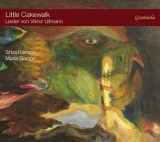Die israelische Sopranistin Shira Karmon und die spanische Pianistin María Garzon haben ihrem Ullmann-Album den Titel Little Cakewalk gegeben, obwohl er, wie sie im Textheft schreiben, mit Liedern von Viktor Ullmann ein Widerspruch zum Inhalt des Programms ist, « wie auch zum Leben und Schicksal Ullmanns: Viele der Lieder auf diesem Album stammen aus der Zeit nach der Machtübernahme der Nationalsozialisten oder seiner Internierung 1942 im Konzentrationslager Theresienstadt, wo er dem Arbeitszwang aufgrund seiner dem Regime nützlichen musikalischen Arbeit entkam. Ullmann bediente sich hier einer vergleichsweise leichter fassbaren Tonsprache, wohl um seinen ihn umgebenden, leidenden Mitmenschen möglichst unbeschwerten Genuss bereiten zu können. »
Die Lieder werden nicht immer ganz textverständlich gesungen, aber das Booklet enthält alle Texte mit einer Übertragung ins Englische.
Die Sopranistin Shira Karmon bemüht sich um einen sehr differenzierten Gesang, um die Hintergründigkeit der Texte, mit ihrer Ironie, ihrem Sarkasmus und ihrer Zweideutigkeit, hörbar zu machen. Sie setzt ihre Stimme voll ein, um ein Höchstmaß an Dramatik und Expressivität zu erzielen. Besonders die leidenschaftlichen, bekenntnishaften Texte der französischen Autorin Louize Labé (ca. 1524-1566), die sich an einen fernen Geliebten richten, erlangen so eine tiefgründige musikalische Auslegung.
Auch die feinfühlige und ausdrucksvolle Klavierbegleitung von Maria Garzon trägt zum guten Eindruck beim, den dieses Album hinterlässt.
The Israeli soprano Shira Karmon and the Spanish pianist María Garzón have given their Ullmann album the title Little Cakewalk, although, as they write in the booklet, with songs by Viktor Ullmann the title is a contradiction to the content of the program, « as well as to Ullmann’s life and fate: Many of the songs on this album date from the period after the Nazis came to power or his internment in 1942 in the Theresienstadt concentration camp, where he escaped forced labor because of his musical work, which was useful to the regime. Ullmann used a comparatively easier to grasp musical language here, probably in order to give his suffering fellow human beings around him the most carefree enjoyment possible. »
The sung text is not always comprehensible in this recording, but the booklet contains all the texts with a translation into English.
The soprano Shira Karmon sings in a much differentiated way in order to make the subtlety of the texts, with their irony, sarcasm and ambiguity, audible. She makes full use of her voice to achieve maximum drama and expressiveness. In particular, the passionate, confessional texts by the French author Louize Labé (ca. 1524-1566), which are addressed to a distant lover, are given a profound musical interpretation.
Maria Garzon’s sensitive and expressive piano accompaniment also contributes to the positive impression this album leaves behind.






















